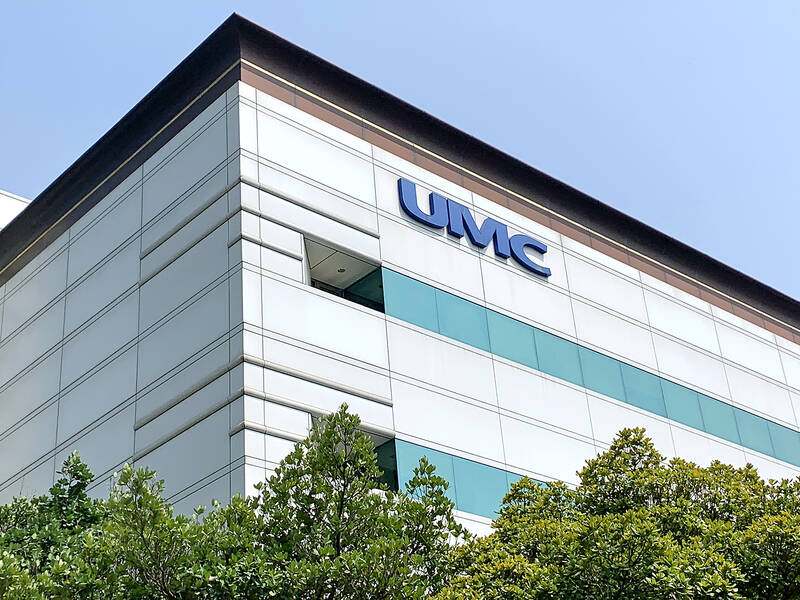United Microelectronics Corp (UMC, 聯電) yesterday held a ceremony to celebrate the arrival of the first equipment tools for phase 3 expansion at its Fab12i in Singapore.
UMC, the second largest pure play wafer foundry operator in Taiwan, called the equipment move-in a new milestone for its production in Singapore with guests including representatives from Singapore’s Economic Development Board (EDB), Jurong Town Council (JTC), the Institute of Microelectronics (IME) as well as its construction partners, major equipment and material vendors.
In February 2022, UMC announced plans to invest US$5 billion in the phase 3 expansion of its Fab12i, or Fab12i P3, in Singapore and also designated the new facility one of the most advanced semiconductor fabs in the country, set to roll out chips made on its 22 nanometer and 28nm processes.

Photo: Grace Hung, Taipei Times
UMC said yesterday that construction of the new 12-inch wafer facility is scheduled to be completed in the middle of this year.
The company added that mass production in the phase 3 facility at the Fab12i had previously been set for mid-next year but has now been pushed back to early 2026 due to adjustments in orders by clients.
The expansion of the Fab12i aims to meet demand for 5G, automotive and Internet of things applications, UMC said.
UMC has run pure play semiconductor foundries in Singapore for more than 20 years, using the Fab12i as a research and development center for advanced specialty technology development.
In the first quarter, UMC posted NT$10.46 billion (US$324 million) in net profit, down about 20 percent from the previous quarter, due to slow season effects, with earnings per share of NT$0.84, compared with NT$1.06 a quarter earlier.
However, the company predicts growth momentum will pick up in the second quarter with inventories in PCs, consumer electronic devices and communication gadgets returning to healthy levels.
The chipmaker forecasts that second quarter shipments will rise 1-3 percent from the first quarter.

Hon Hai Precision Industry Co (鴻海精密) yesterday said that its research institute has launched its first advanced artificial intelligence (AI) large language model (LLM) using traditional Chinese, with technology assistance from Nvidia Corp. Hon Hai, also known as Foxconn Technology Group (富士康科技集團), said the LLM, FoxBrain, is expected to improve its data analysis capabilities for smart manufacturing, and electric vehicle and smart city development. An LLM is a type of AI trained on vast amounts of text data and uses deep learning techniques, particularly neural networks, to process and generate language. They are essential for building and improving AI-powered servers. Nvidia provided assistance

DOMESTIC SUPPLY: The probe comes as Donald Trump has called for the repeal of the US$52.7 billion CHIPS and Science Act, which the US Congress passed in 2022 The Office of the US Trade Representative is to hold a hearing tomorrow into older Chinese-made “legacy” semiconductors that could heap more US tariffs on chips from China that power everyday goods from cars to washing machines to telecoms equipment. The probe, which began during former US president Joe Biden’s tenure in December last year, aims to protect US and other semiconductor producers from China’s massive state-driven buildup of domestic chip supply. A 50 percent US tariff on Chinese semiconductors began on Jan. 1. Legacy chips use older manufacturing processes introduced more than a decade ago and are often far simpler than

STILL HOPEFUL: Delayed payment of NT$5.35 billion from an Indian server client sent its earnings plunging last year, but the firm expects a gradual pickup ahead Asustek Computer Inc (華碩), the world’s No. 5 PC vendor, yesterday reported an 87 percent slump in net profit for last year, dragged by a massive overdue payment from an Indian cloud service provider. The Indian customer has delayed payment totaling NT$5.35 billion (US$162.7 million), Asustek chief financial officer Nick Wu (吳長榮) told an online earnings conference. Asustek shipped servers to India between April and June last year. The customer told Asustek that it is launching multiple fundraising projects and expected to repay the debt in the short term, Wu said. The Indian customer accounted for less than 10 percent to Asustek’s

Gasoline and diesel prices this week are to decrease NT$0.5 and NT$1 per liter respectively as international crude prices continued to fall last week, CPC Corp, Taiwan (CPC, 台灣中油) and Formosa Petrochemical Corp (台塑石化) said yesterday. Effective today, gasoline prices at CPC and Formosa stations are to decrease to NT$29.2, NT$30.7 and NT$32.7 per liter for 92, 95 and 98-octane unleaded gasoline respectively, while premium diesel is to cost NT$27.9 per liter at CPC stations and NT$27.7 at Formosa pumps, the companies said in separate statements. Global crude oil prices dropped last week after the eight OPEC+ members said they would